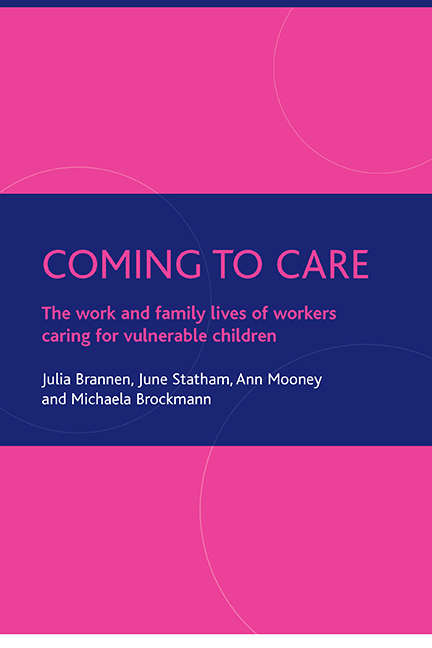Book contents
- Frontmatter
- Contents
- List of tables and boxes
- Acknowledgements
- one Setting the scene
- two The study
- three The origins of a care ethic in care workers’ childhoods
- four Entering care work with vulnerable children
- five Care workers’ careers and identities: change and continuity
- six What do vulnerable children need? Understandings of care
- seven Experiences of care work
- eight Leavers, movers and stayers
- nine Managing care work and family life
- ten Conclusions and policy implications
- Appendix: Boxes and additional tables
- References
- Index
seven - Experiences of care work
Published online by Cambridge University Press: 15 September 2022
- Frontmatter
- Contents
- List of tables and boxes
- Acknowledgements
- one Setting the scene
- two The study
- three The origins of a care ethic in care workers’ childhoods
- four Entering care work with vulnerable children
- five Care workers’ careers and identities: change and continuity
- six What do vulnerable children need? Understandings of care
- seven Experiences of care work
- eight Leavers, movers and stayers
- nine Managing care work and family life
- ten Conclusions and policy implications
- Appendix: Boxes and additional tables
- References
- Index
Summary
“They should be a lot more honest [about the nature of the work]…. Because I think people tend to be put off because of the bad press that they get. And that tends to highlight like the bad things rather than the positive things.” (Debra Henry, a foster carer)
This chapter sets out to document the everyday reality of working with vulnerable children in both home and institutional settings. There is a fairly substantial literature on the attractions of care work with vulnerable children and their families, whether this be foster care (Triseliotis et al, 2000; Sinclair et al, 2004), residential care (DH, 1998; Mainey, 2003), childminding (Statham et al, 2000; Mooney et al, 2001) or family support work (Carpenter and Dutton, 2003). Common motivations across these groups include wanting to make a positive difference to people's lives, enjoying working with children and young people, and gaining satisfaction from helping them to overcome challenges and difficulties.
But how do these expectations match up to the reality of the everyday work? Previous research involving residential social workers, foster carers and childminders has reported a high level of job satisfaction (for example, Penna et al, 1995; Aldgate and Bradley, 1999; McLean, 1999; Mooney et al, 2001; Mainey, 2003; Milligan et al, 2005; Sinclair, 2005). Much less has been written about the lived experience of providing care for children who need support from social services. Yet there are good reasons for looking in depth at the nature of care work with vulnerable children. There is little public understanding of what such work entails, or the range of ways in which it can be carried out. Research commissioned by the Department of Health found ‘a lack of basic knowledge about both social work and social care’ among the general public, and generally negative perceptions that are thought to contribute to recruitment and retention difficulties in this field (Central Office of Information Communications, 2001, p 61).
Some types of work with children, for example family support work and community childminding, have received relatively little attention in the literature, perhaps reflecting the lower priority often attached to preventive work compared to the services needed by children who live away from home. This sense of invisibility, even within their own organisation, was reflected in the comment of a family support worker in the current study who referred to herself and her team as ‘the silent workforce’.
- Type
- Chapter
- Information
- Coming to CareThe Work and Family Lives of Workers Caring for Vulnerable Children, pp. 129 - 152Publisher: Bristol University PressPrint publication year: 2007



